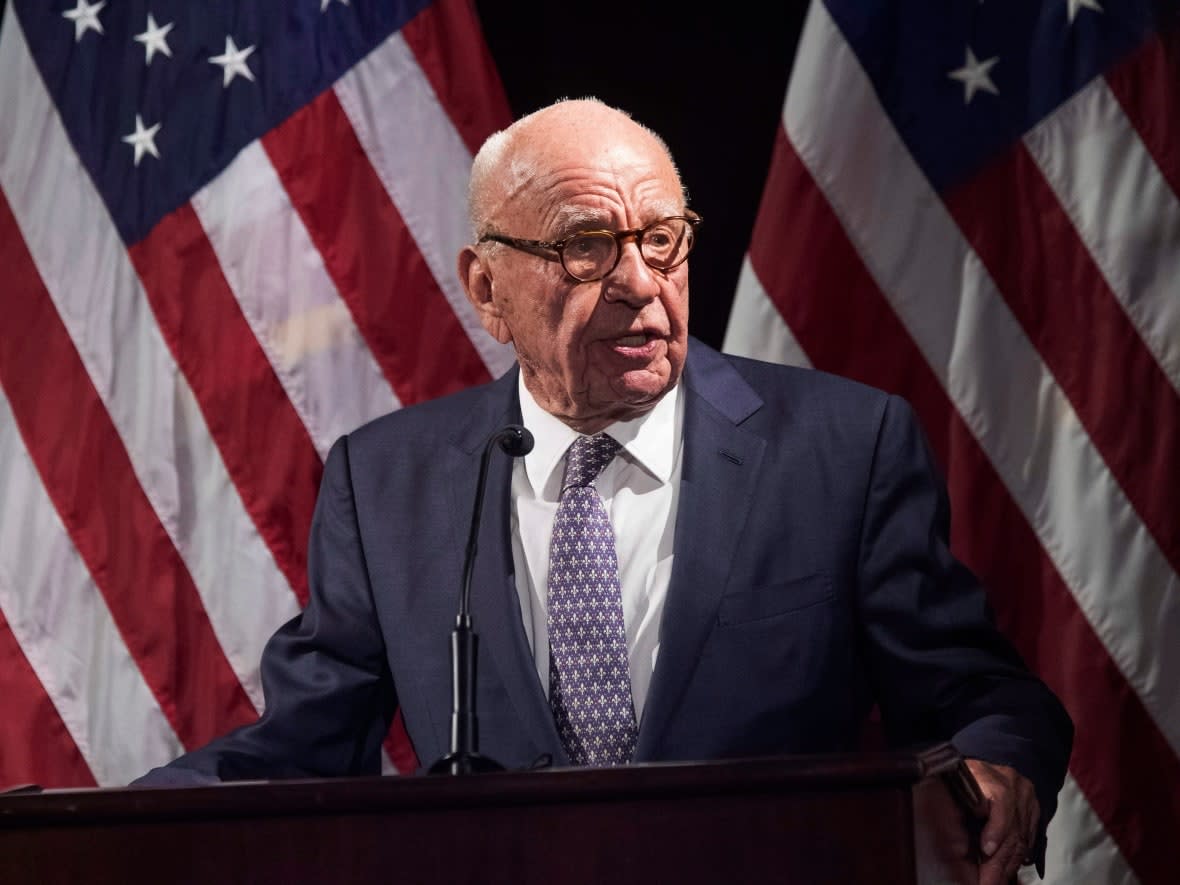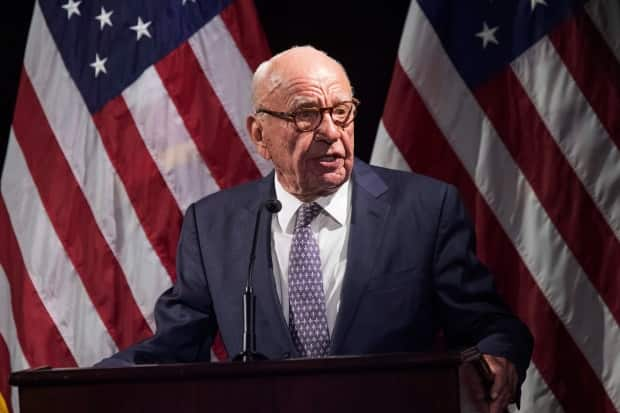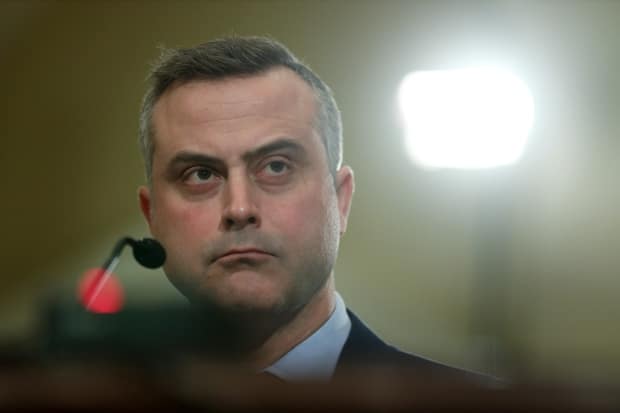Fox's Murdoch called election fraud claims a 'Trump myth,' Toronto's Dominion says in court filing

Toronto-founded Dominion Voting Systems and Fox News exchanged volleys in court filings on Thursday, with internal texts and emails appearing to provide obstacles for the top-rated cable network to overcome in a high-stakes defamation case.
The internal communications were included in a redacted summary judgment brief filed Thursday by lawyers for Dominion. The company was founded by Canadian John Poulos in Toronto and now has headquarters in Denver.
After Fox News called the state of Arizona for Joe Biden on election night in 2020, and through to the Jan. 6, 2021, Capitol riot, Fox News and right-wing broadcasters Newsmax and OANN broadcast a series of claims from surrogates of Donald Trump regarding the company's voting machines that were never supported by fact.
Trump allies like Rudy Giuliani and Sidney Powell appeared on Fox News and falsely claimed Dominion software may have manipulated vote counts in favour of Biden. Wild claims about the company's origin story, connecting it to late Venezuelan dictator Hugo Chavez, were also made.

What Dominion says
Dominion sued Fox News in March 2021, in Delaware state court. Through the discovery process, Dominion has gained access to internal Fox emails, and several network hosts and executives have sat for depositions, as has Fox Corp. chair Rupert Murdoch.
The result, according to the plaintiffs in Thursday's filing obtained by CBC News, was that "witness after witness has admitted under oath that they have not seen evidence proving Dominion stole the 2020 Presidential Election or that they do not believe Dominion did."

Dominion alleges, citing some of the Fox messages, that the network wanted to keep up with the likes of Newsmax and OANN on the electoral fraud claims in order not to lose viewers to those other two networks.
Dominion says it didn't stand by idly at the time, pointing to "over 3,600 separate communications to Fox with at least a dozen separate and widely circulated fact-check emails — each pointing to verifiable third-party information debunking the claims."
Furthermore, the company said, rulings in other cases establish precedent that publishers can't hide behind the fact the false utterances were made by non-employees.
What do the internal Fox messages say?
Dominion's filing includes dozens of emails and statements in which Murdoch and Fox executives and hosts say that the claims made about Dominion on-air were false.
"Sidney Powell is lying," host Tucker Carlson said to his producer on Nov. 16, 2020, while host Sean Hannity referred to Giuliani as "acting like an insane person" around the same time.

Carlson also lashed out at a female Fox reporter who tweeted a fact-check on Trump fraud claims, saying it was "measurably hurting the company" and that she should be fired. The tweet by the reporter was deleted within hours.
Murdoch expressed his concerns for several weeks, telling an executive on Nov. 6 that "if Trump becomes a sore loser we should watch Sean [Hannity] especially and others don't sound the same." The very next day, the Murdoch-owned New York Post editorial board argued that Trump needed to "stop the 'stolen election' rhetoric" and for his advisers to "Get Rudy Giuliani off TV," but Fox didn't follow suit.
The day before the Capitol riot, Rupert Murdoch told Fox News CEO Suzanne Scott, "It's been suggested our prime time three [Carlson, Hannity, Laura Ingraham] should independently or together say something like, 'the election is over and Joe Biden won.'"
It would "go a long way to stop the Trump myth that the election stolen," Murdoch wrote. No such statement aired.
What Fox News says
Fox News has said claims being made by legal representatives of the president of the United States are inherently newsworthy, and they've called the lawsuit an assault on the First Amendment.
Lawyers for the cable news giant argued in a counterclaim unsealed Thursday that Dominion has advanced "novel defamation theories" and that it has cherry-picked internal conversations of Fox staff and management.
"Dominion brought this lawsuit to punish FNN (Fox News Network) for reporting on one of the biggest stories of the day," the counterclaim states. "The very fact of those allegations was newsworthy."
Fox lawyers say Dominion's own public relations firm expressed skepticism in December 2020, as to whether the network's coverage was defamatory. They also point to an email from Oct. 30, 2020, just days before the election, in which Dominion's director of product strategy and security complained that the company's products were "just riddled with bugs," although the context of that statement wasn't immediately clear.
The stakes
A five-week trial in the case is scheduled to begin on April 17.
The judge in the case has ruled that he will consider Dominion to be a public figure in the lawsuit. That means Dominion must prove by a preponderance of the evidence not just that the statements were false but that the Fox defendants acted with actual malice or reckless disregard for the truth.
Dominion has asked for $1.6 billion US in damages. Fox has called the amount a "staggering" figure and accused Dominion's private equity owners Staple Street Capital Partners of using the suit to seek a windfall on an asset they purchased at an $80 million value in 2018.
In its filing, Fox claimed Dominion remains a financially sound company with annual revenues approaching $100 million.
Dominion says it has suffered reputational damage and can point to a county in California recently voting to discontinue using the company's voting machines, a choice that one of the dissenting voters lamented was "based on feeling and emotion but not evidence." Dominion's Poulos recently told 60 Minutes that the allegations have subjected the company's employees to email and phone threats and harassment.
Another voting technology company, Smartmatic, has also pursued damages directed at select news networks and prominent Trump allies.
The wider context
The majority of U.S. defamation cases, because of the high bar to prove actual malice, don't make it far. For those that do, media organizations often want to avoid an airing of dirty laundry, leading to settlements — including when Fox itself was sued by the parents of the slain Democratic organization staffer Seth Rich, and the Washington Post and CNN when they were sued by a Kentucky high school student whose actions at a D.C. protest were distorted.
In a recent case, former vice-presidential candidate Sarah Palin was not able to prove she took any reputational damage in a case against the New York Times.

Fox said Thursday that "the core of this case remains about freedom of the press and freedom of speech, which are fundamental rights afforded by the Constitution and protected by New York Times v. Sullivan."
That statement is somewhat ironic given that conservatives like Trump and potential 2024 presidential election candidate Gov. Ron DeSantis of Florida have expressed their dismay at the protections offered to media companies in the landmark 1964 Sullivan ruling by the U.S. Supreme Court. Both would love to see aggrieved parties be able to more easily sue media organizations.
Current Supreme Court justices Clarence Thomas and Neil Gorsuch in the past have made statements expressing their openness to hearing a case that would put Sullivan under the microscope.
"The lack of historical support for this Court's actual malice requirement is reason enough to take a second look at the Court's doctrine," Thomas wrote in a 2021 case.


